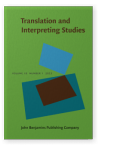Vol. 18:1 (2023) ► pp.113–138
The X-word
Translating profanity in contemporary Russian poetry
This article describes changes in the use of profanity in contemporary Russian poetry and its implications for translation into English. While Russian poetry now more closely resembles English-language poetry in embracing the profanity typical of conversational speech, the highly taboo nature of Russian profanity is still relevant, including gender-specific taboos. Using examples from a range of female and male poets from the 2000s and 2010s (including Dina Gatina, Elena Fanailova, Dmitri Prigov, Andrei Rodionov, Alexander Skidan, Oksana Vasyakina, Lida Yusupova and others), the article explores the ambivalent status of profane language today, whereby the same phrase for different speakers can be considered entirely unremarkable or profoundly taboo. In addition to the exigencies of poetic form, this is the most relevant factor (and vexing problem) for Russian-to-English translation. Special attention is also paid to specifically queer uses of profanity, with the suggestion that profanity is perhaps best translated in a maximally expressive sociolect-specific way.
Article outline
- On Mat
- Examples from contemporary poetry
- Conclusion
- Acknowledgements
- Notes
-
References
